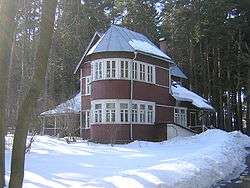Peredelkino
Peredelkino (Russian: Переде́лкино, IPA: [pʲɪrʲɪˈdʲelkʲɪnə]) is a dacha complex situated just to the southwest of Moscow, Russia.

History
The settlement originated as the estate of Peredeltsy, owned by the Leontievs (maternal relatives of Peter the Great), then by Princes Dolgorukov and by the Samarins. After a railway passed through the village in the 19th century, it was renamed Peredelkino. In 1934, Maxim Gorky suggested handing over the area to the Union of Soviet Writers. Within several years, about fifty wooden cottages were constructed in Peredelkino by writers to German designs.
Among the littérateurs who settled in Peredelkino were Boris Pasternak, Korney Chukovsky, Arseny Tarkovsky (all three buried at the local cemetery), Ilya Ehrenburg, Veniamin Kaverin, Leonid Leonov, Ilya Ilf, Vsevolod Ivanov, Nikolay Zabolotsky, Boris Pilnyak, Lilya Brik, Konstantin Simonov, Alexander Fadeyev, and Mikhail Bakhtin. Heinrich Neuhaus son's, the pianist Stanislav Neuhaus, after father's dead, has lived with his mother and Boris Pasternak in Peredelkino. Turkish poet Nâzım Hikmet spent the early years of his self-imposed exile in the USSR at Peredelkino. More recently, Yevgeny Yevtushenko, Andrei Voznesensky, Bella Akhmadulina, Robert Rozhdestvensky, and Zurab Tsereteli moved into the area as well.
The arrest of author and playwright Isaak Babel, one of the most notorious events of Joseph Stalin's Great Purge, took place in Peredelkino on May 15, 1939.[1] Babel was then taken by automobile to the Lubyanka Prison, tortured, and shot by the NKVD.
Peredelkino is presumably the source for the name of Mikhail Bulgakov's Perelygino. But, Bulgakov places his Perelygino on the Klyazma, Bolshevo, which is where another writers' colony was.[2] The village is also featured in John le Carré's spy novel The Russia House.
In 1988, the cottages of Chukovsky and Pasternak were proclaimed memorial houses, while the area of Peredelkino was designated a "historical and cultural reserve". A decade later, the dacha of Bulat Okudzhava was also opened to the public as a museum. After the collapse of the Soviet Union, Peredelkino was taken over by the Russian new rich. Many new apartment buildings were constructed in Novo-Peredelkino district nearby.
As of 2005, the most notable resident of Peredelkino was Alexy II, Patriarch of Moscow and all Russia. The summer residence of Lukino (originally built in the Russian Revival-style for Baron de Bodé) adjoins the 19th-century church of the Transfiguration of the Saviour. Alexy II died there on December 5, 2008.
The territory of the complex is divided between three administrative units: its eastern portion is located in jurisdiction of Western Administrative Okrug of Moscow, its northwestern portion—in jurisdiction of Odintsovsky District of Moscow Oblast, and its southwestern portion—in jurisdiction of Leninsky District of Moscow Oblast.
See also
References
- Antonina Pirozhkova, At His Side; The Last Years of Isaac Babel, page 115.
- "Master: Peredelkino". Bulgakov's Master and Margarita. Middlebury College. Retrieved 2009-04-06.
Further reading
- Lev Lobov and Kira Vasilyeva. Peredelkino. A Tale of the Writers' Village. Moscow, 2011. - 580 pp.; 380 images. ISBN 978-5-91187-139-0
External links
- Peredelkino unofficial website (in English)